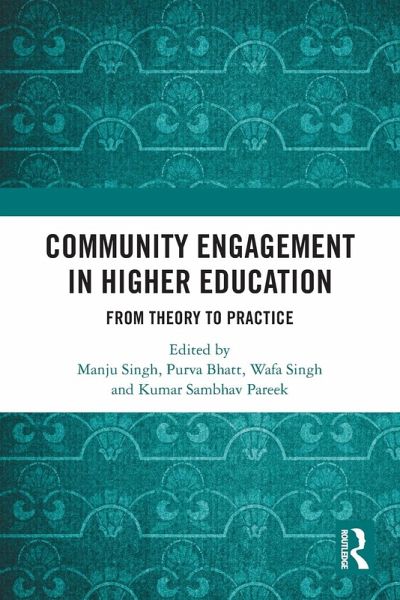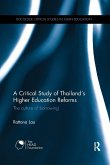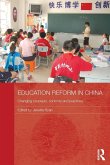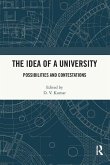Community Engagement in Higher Education
From Theory to Practice
Herausgeber: Singh, Manju; Pareek, Kumar Sambhav; Singh, Wafa; Bhatt, Purva
Community Engagement in Higher Education
From Theory to Practice
Herausgeber: Singh, Manju; Pareek, Kumar Sambhav; Singh, Wafa; Bhatt, Purva
- Broschiertes Buch
- Merkliste
- Auf die Merkliste
- Bewerten Bewerten
- Teilen
- Produkt teilen
- Produkterinnerung
- Produkterinnerung
This book explores the finer nuances of community engagement in Indian higher education ranging from theory to practice. It contextualizes the concept and practice of community engagement in the contemporary context, capturing global experiences, insights, and varied standpoints.
Andere Kunden interessierten sich auch für
![Higher Education, Public Good and Markets Higher Education, Public Good and Markets]() Jandhyala B G TilakHigher Education, Public Good and Markets60,99 €
Jandhyala B G TilakHigher Education, Public Good and Markets60,99 €![A Critical Study of Thailand's Higher Education Reforms A Critical Study of Thailand's Higher Education Reforms]() Rattana LaoA Critical Study of Thailand's Higher Education Reforms71,99 €
Rattana LaoA Critical Study of Thailand's Higher Education Reforms71,99 €![Education Reform in China Education Reform in China]() Education Reform in China62,99 €
Education Reform in China62,99 €![The Idea of a University The Idea of a University]() The Idea of a University61,99 €
The Idea of a University61,99 €![The Glocalization of Early Childhood Curriculum The Glocalization of Early Childhood Curriculum]() Philip Hui LiThe Glocalization of Early Childhood Curriculum61,99 €
Philip Hui LiThe Glocalization of Early Childhood Curriculum61,99 €![Asiatic Researches, or, Transactions of the Society Instituted in Bengal for Inquiring Into the History and Antiquities, the Arts, Sciences and Litera Asiatic Researches, or, Transactions of the Society Instituted in Bengal for Inquiring Into the History and Antiquities, the Arts, Sciences and Litera]() Asiatic Researches, or, Transactions of the Society Instituted in Bengal for Inquiring Into the History and Antiquities, the Arts, Sciences and Litera29,99 €
Asiatic Researches, or, Transactions of the Society Instituted in Bengal for Inquiring Into the History and Antiquities, the Arts, Sciences and Litera29,99 €![The Dragon in China and Japan The Dragon in China and Japan]() Marinus Willem De VisserThe Dragon in China and Japan25,99 €
Marinus Willem De VisserThe Dragon in China and Japan25,99 €-
-
-
This book explores the finer nuances of community engagement in Indian higher education ranging from theory to practice. It contextualizes the concept and practice of community engagement in the contemporary context, capturing global experiences, insights, and varied standpoints.
Hinweis: Dieser Artikel kann nur an eine deutsche Lieferadresse ausgeliefert werden.
Hinweis: Dieser Artikel kann nur an eine deutsche Lieferadresse ausgeliefert werden.
Produktdetails
- Produktdetails
- Verlag: Taylor & Francis
- Seitenzahl: 300
- Erscheinungstermin: 9. Oktober 2024
- Englisch
- Abmessung: 234mm x 156mm x 17mm
- Gewicht: 454g
- ISBN-13: 9781032259246
- ISBN-10: 1032259248
- Artikelnr.: 71714843
- Herstellerkennzeichnung
- Libri GmbH
- Europaallee 1
- 36244 Bad Hersfeld
- gpsr@libri.de
- Verlag: Taylor & Francis
- Seitenzahl: 300
- Erscheinungstermin: 9. Oktober 2024
- Englisch
- Abmessung: 234mm x 156mm x 17mm
- Gewicht: 454g
- ISBN-13: 9781032259246
- ISBN-10: 1032259248
- Artikelnr.: 71714843
- Herstellerkennzeichnung
- Libri GmbH
- Europaallee 1
- 36244 Bad Hersfeld
- gpsr@libri.de
Manju Singh has more than three and half decade of accomplished well recognized teaching and research career in renowned Institutions of higher education comprising 15 years experience as Full Professor in Economics. Presently Professor in Department of Humanities and Social Science at Malaviya National Institute of Technology, Jaipur (One of the national institute of Importance in India). Prof Singh is the recipient of several international and national recognitions including Sir Ratan Tata Fellow from London School of Economics, UK, Full scholarship for the Global Network of Government Innovators at KSG, Harvard University, USA and ICSSR Doctoral Fellow. She is a certified Mentor under UNESCO chair from University of Victoria, Canada and also established one of the Hubs as Coordinator for Community based participatory research in India. Prof. Singh has evolved an interdisciplinary approach and applied aspect in all attempts. She is a keen project planner, strategist and implementer with demonstrated abilities in devising activities and organizing multidimensional events of social engineering on campus and out of campus. Prof Singh has led various projects with prestigious institutions, think tanks and forums. She is also a reviewer of various prestigious peer-reviewed journals. The focus areas of her research include Innovation in higher Education, Gender mainstreaming, Technology Diffusion, Social Engineering, Development Economics, Public Policy. Purva Bhatt is presently a doctoral research scholar at the Department of Humanities and Social Sciences, Malaviya National Institute of Technology Jaipur, which is among a few of the institutes of national importance in India. She has formerly worked as an Assistant Professor of Sociology at St. Xavier's College Jaipur and as Research Co-Director with Union College, New York. As a community-based participatory researcher, she has worked extensively with grassroots communities. Her research interests primarily lie in the area of education, decoloniality, indigenous knowledge systems, science-technology-society, community engagement, regional development, participatory rural development, and policymaking. Her research collaborations include national and international research projects with prestigious organizations such as the Technical Education Quality Improvement Programme of the Government of India (TEQIP), Rural Technology Action Group (RuTAG) at the Indian Institute of Technology Delhi (Institute of National Importance), National Cooperative Union of India (NCUI), Unnat Bharat Abhiyan (UBA) which is a government of India flagship program and is inspired by the vision of transformational change in rural development processes. Purva Bhatt is the recipient of the prestigious HH Dalai Lama Gurukul Fellowship conferred by the Foundation of Universal Responsibility of His Holiness Dalai Lama. As a student, she has remained a Gold Medalist and has been awarded for her academic excellence by the Hon'ble Governor. She is associated with various reputed forums, such as an associate member of the South African BRICS Youth Association (SABYA), Rashtriya Samaj Vigyan Parishad, and the Indian Sociological Society. She is also a part of multiple youth forums which work on youth advocacy and participatory citizen projects. As a change agent, she is the founding member of non-governmental organizations like Karuna and Bhatt Raja Sadashiv Foundation that influence policymaking and model innovations in action to create a transformational socio-political, economic and cultural impact on the stakeholder communities. Wafa Singh is a recipient of the Durban University of Technology (DUT) Doctoral Scholarship Scheme, and is currently pursuing her doctoral studies at DUT, Durban, South Africa. Ms. Singh has a decade long work experience in the Higher Education sector and has worked extensively in the field of Social Responsibility & Community Engagement in Higher Education, in her capacity as the former India Research Coordinator of the UNESCO Chair in Community Based Research and Social Responsibility in Higher Education. In this role, she has contributed to many research projects, both at the national level (in collaboration with British Council, India) and at the international level (in collaboration with International Development Research Centre (IDRC), Canada, and The Social Sciences and Humanities and Research Council (SSHRC), Canada). Her work in this field includes publication of several journal articles and a co-edited book titled, ' Knowledge and Engagement: Building Capacity for the Next Generation of Community Based Researchers'. She has also presented papers at the European Higher Education Society-EAIR Forum in Leiden, Netherlands in 2019; 2nd Higher Education Responsible Research and Innovation (HEIRRI) Conference in Vienna in 2018, among others. She is also a UNESCO Chair in Community Based Research and Social Responsibility in Higher Education certified 'Community Based Participatory Research (CBPR) Trainer' and has delivered several trainings on CBPR for academics and civil society practitioners from India and beyond. Kumar Sambhav Pareek is an Associate Professor in Department of Society-Technology Interface, Central University of Rajasthan, India. Though he has obtained his Masters and Ph.D. degree in Political Science, but he believes in the philosophy of interdisciplinary research. He has more than 14 years of teaching and prolific research experience. He is a keen observer of not only Indian Political System but also of other developing and developed nations. His main area of interest is Political Sociology, e-Government, Ancient Indian Polity, and Indian Political System. Apart from various research publications, Dr. Kumar has authored one book on Primary unit of Indian Political System i.e. "Zila Parishad". Apart from this, he has also published a book on E-Governance titled "Stances of E-Government: Policies, Processes and Technologies" in 2018 with CRC Press. His professional associations include; Life Member of Indian Political Science Association, Life Member of Rajasthan Political Science Association and Life Member of Indian Society for Gandhian Studies.
PART I
Introduction: Positioning Community Engagement in Higher Education
1 Community Engagement in Higher Education: An Introduction
2 Decoloniality, Community Engaged Scholarship and Epistemic Justice
3 Community Engagement in Higher Education Institutions: Critical Enablers
PART II
Global Perspectives: Experiences and Insights
4 Pedagogies of Community Engagement: Reflections from a Higher Education
Setting in the Global South
5 Weaving Knowledge Systems: Challenges and Possible Solutions through
Community-Engaged Research in Canada and Nordic Countries
6 European Science Shops in Higher Education: Building Capacity for Engaged
Research and Teaching
7 University-Community Engagement within the Indonesian Context: A Case
Study of UINSA
8 Community Engagement for Social Transformation: Experiences in the UK and
Canada
9 Insights into Community Engagement at Higher Education Institutions in
South Africa
10 Evolution of Community Engagement Policy Agenda: Italian Perspectives on
Equitable Partnerships Under Growing Neoliberal Pressure
11 Weaving Paths from the Convergence of Knowledge: Colombian Experiences
of University-Community Partnerships
PART III
The Indian Standpoint: Institutional Programmes, Experiences and
Partnerships12 Community Engagement in the Indian Higher Education
Landscape
13 Towards Developing Responsible Managers: Goa Institute of Management's
GiveGoa Initiative
14 Establishing University-Community Collaborations: Experiential Learning
Initiatives at Manipal University, Jaipur
15 Creating a Sustainable Waste Management System as a Service-Learning
Project at Amrita Vishwa Vidyapeetham University
16 Community Engagement as a Tool for Social Development: The Experiences
at Bhagat Phool Singh (BPS) Women's University
17 Service-Learning at Christ University: An Experiential Instrument for
Community Engagement in Higher Education Institutions
18 Mainstreaming Community Engagement and Participation in Urban Planning
Education: A Case Study of MNIT, Jaipur19 Embedding Community Engagement in
the Architecture of JK Lakshmipat University for Achieving the SDGs
PART IV
Conclusion: Ways Forward for Community Engagement in Higher Education
20 Community Engagement in Higher Education: Weaving the Threads and Future
Directions
Introduction: Positioning Community Engagement in Higher Education
1 Community Engagement in Higher Education: An Introduction
2 Decoloniality, Community Engaged Scholarship and Epistemic Justice
3 Community Engagement in Higher Education Institutions: Critical Enablers
PART II
Global Perspectives: Experiences and Insights
4 Pedagogies of Community Engagement: Reflections from a Higher Education
Setting in the Global South
5 Weaving Knowledge Systems: Challenges and Possible Solutions through
Community-Engaged Research in Canada and Nordic Countries
6 European Science Shops in Higher Education: Building Capacity for Engaged
Research and Teaching
7 University-Community Engagement within the Indonesian Context: A Case
Study of UINSA
8 Community Engagement for Social Transformation: Experiences in the UK and
Canada
9 Insights into Community Engagement at Higher Education Institutions in
South Africa
10 Evolution of Community Engagement Policy Agenda: Italian Perspectives on
Equitable Partnerships Under Growing Neoliberal Pressure
11 Weaving Paths from the Convergence of Knowledge: Colombian Experiences
of University-Community Partnerships
PART III
The Indian Standpoint: Institutional Programmes, Experiences and
Partnerships12 Community Engagement in the Indian Higher Education
Landscape
13 Towards Developing Responsible Managers: Goa Institute of Management's
GiveGoa Initiative
14 Establishing University-Community Collaborations: Experiential Learning
Initiatives at Manipal University, Jaipur
15 Creating a Sustainable Waste Management System as a Service-Learning
Project at Amrita Vishwa Vidyapeetham University
16 Community Engagement as a Tool for Social Development: The Experiences
at Bhagat Phool Singh (BPS) Women's University
17 Service-Learning at Christ University: An Experiential Instrument for
Community Engagement in Higher Education Institutions
18 Mainstreaming Community Engagement and Participation in Urban Planning
Education: A Case Study of MNIT, Jaipur19 Embedding Community Engagement in
the Architecture of JK Lakshmipat University for Achieving the SDGs
PART IV
Conclusion: Ways Forward for Community Engagement in Higher Education
20 Community Engagement in Higher Education: Weaving the Threads and Future
Directions
PART I
Introduction: Positioning Community Engagement in Higher Education
1 Community Engagement in Higher Education: An Introduction
2 Decoloniality, Community Engaged Scholarship and Epistemic Justice
3 Community Engagement in Higher Education Institutions: Critical Enablers
PART II
Global Perspectives: Experiences and Insights
4 Pedagogies of Community Engagement: Reflections from a Higher Education
Setting in the Global South
5 Weaving Knowledge Systems: Challenges and Possible Solutions through
Community-Engaged Research in Canada and Nordic Countries
6 European Science Shops in Higher Education: Building Capacity for Engaged
Research and Teaching
7 University-Community Engagement within the Indonesian Context: A Case
Study of UINSA
8 Community Engagement for Social Transformation: Experiences in the UK and
Canada
9 Insights into Community Engagement at Higher Education Institutions in
South Africa
10 Evolution of Community Engagement Policy Agenda: Italian Perspectives on
Equitable Partnerships Under Growing Neoliberal Pressure
11 Weaving Paths from the Convergence of Knowledge: Colombian Experiences
of University-Community Partnerships
PART III
The Indian Standpoint: Institutional Programmes, Experiences and
Partnerships12 Community Engagement in the Indian Higher Education
Landscape
13 Towards Developing Responsible Managers: Goa Institute of Management's
GiveGoa Initiative
14 Establishing University-Community Collaborations: Experiential Learning
Initiatives at Manipal University, Jaipur
15 Creating a Sustainable Waste Management System as a Service-Learning
Project at Amrita Vishwa Vidyapeetham University
16 Community Engagement as a Tool for Social Development: The Experiences
at Bhagat Phool Singh (BPS) Women's University
17 Service-Learning at Christ University: An Experiential Instrument for
Community Engagement in Higher Education Institutions
18 Mainstreaming Community Engagement and Participation in Urban Planning
Education: A Case Study of MNIT, Jaipur19 Embedding Community Engagement in
the Architecture of JK Lakshmipat University for Achieving the SDGs
PART IV
Conclusion: Ways Forward for Community Engagement in Higher Education
20 Community Engagement in Higher Education: Weaving the Threads and Future
Directions
Introduction: Positioning Community Engagement in Higher Education
1 Community Engagement in Higher Education: An Introduction
2 Decoloniality, Community Engaged Scholarship and Epistemic Justice
3 Community Engagement in Higher Education Institutions: Critical Enablers
PART II
Global Perspectives: Experiences and Insights
4 Pedagogies of Community Engagement: Reflections from a Higher Education
Setting in the Global South
5 Weaving Knowledge Systems: Challenges and Possible Solutions through
Community-Engaged Research in Canada and Nordic Countries
6 European Science Shops in Higher Education: Building Capacity for Engaged
Research and Teaching
7 University-Community Engagement within the Indonesian Context: A Case
Study of UINSA
8 Community Engagement for Social Transformation: Experiences in the UK and
Canada
9 Insights into Community Engagement at Higher Education Institutions in
South Africa
10 Evolution of Community Engagement Policy Agenda: Italian Perspectives on
Equitable Partnerships Under Growing Neoliberal Pressure
11 Weaving Paths from the Convergence of Knowledge: Colombian Experiences
of University-Community Partnerships
PART III
The Indian Standpoint: Institutional Programmes, Experiences and
Partnerships12 Community Engagement in the Indian Higher Education
Landscape
13 Towards Developing Responsible Managers: Goa Institute of Management's
GiveGoa Initiative
14 Establishing University-Community Collaborations: Experiential Learning
Initiatives at Manipal University, Jaipur
15 Creating a Sustainable Waste Management System as a Service-Learning
Project at Amrita Vishwa Vidyapeetham University
16 Community Engagement as a Tool for Social Development: The Experiences
at Bhagat Phool Singh (BPS) Women's University
17 Service-Learning at Christ University: An Experiential Instrument for
Community Engagement in Higher Education Institutions
18 Mainstreaming Community Engagement and Participation in Urban Planning
Education: A Case Study of MNIT, Jaipur19 Embedding Community Engagement in
the Architecture of JK Lakshmipat University for Achieving the SDGs
PART IV
Conclusion: Ways Forward for Community Engagement in Higher Education
20 Community Engagement in Higher Education: Weaving the Threads and Future
Directions








